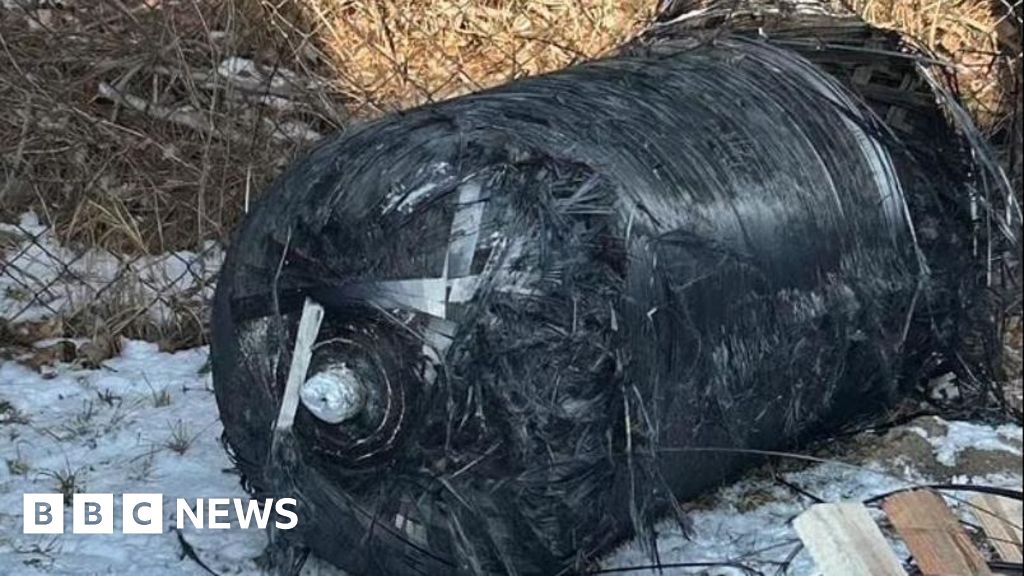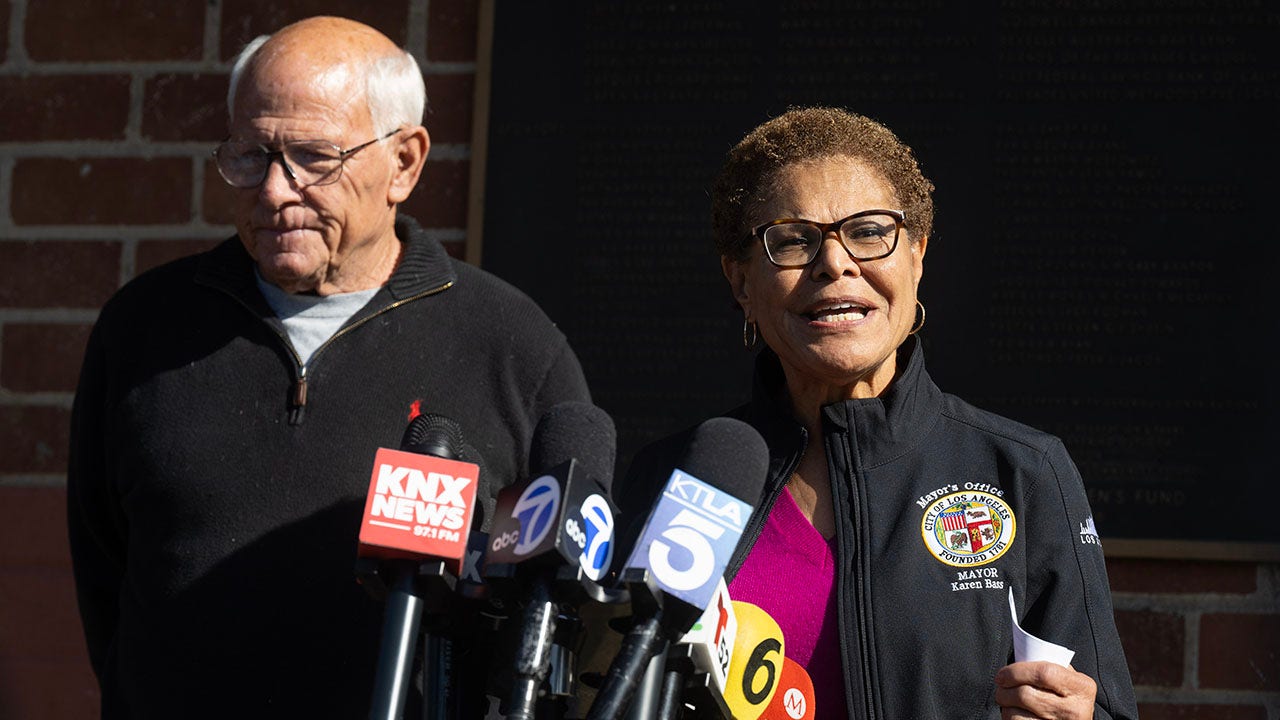AFPResidents said there were fresh Israeli strikes in the south-west of Jabalia overnightIsrael’s defence minister has said troops will remain in the so-called security zones they have established by seizing large areas of Gaza even after an end to the war.Israel Katz said the zones would provide a “buffer” to protect Israeli communities “in any temporary or permanent situation”, and that “tens of per cent” of the Palestinian territory had been added since the Israeli offensive resumed three weeks ago.He said Israel would continue its six-week blockade of humanitarian aid to pressure Hamas to release hostages, despite the UN warning of “devastating” consequences.Meanwhile, hospital officials said at least 24 Palestinians were killed in Israeli strikes across Gaza on Wednesday.The majority of those reported killed were in Gaza City, in the north. They included 10 members of the Hassouna family, mostly children and women. One of them was Fatema Hassouna – a young writer and photographer.The BBC has asked the Israeli military for comment on the strike.The Hamas-run Civil Defence agency also said two people were killed in an Israeli strike on tents for displaced families in the Yarmouk Stadium, to the north-west, on Tuesday night.Another two people were killed after a strike at a camp near southern city of Khan Younis, it added.Gaza’s Hamas-run health ministry has said more than 1,650 people have been killed since the war resumed on 18 March.The UN has said 69% of the territory is now under active Israeli military evacuation orders, within a “no-go” zone running along the borders with Israel and Egypt and the Wadi Gaza valley south of Gaza City, or both. It has estimated that 500,000 people have been displaced again, with no safe place to go.The Israel Defense Forces (IDF) has said it has killed “hundreds of terrorists” in strikes while troops have advanced into several areas in the north and the south. It has established a new corridor that cuts off the city of Rafah from neighbouring Khan Younis and designated 30% of Gaza as an “operational security perimeter”.On Wednesday, Israel Katz said in a statement that the Israeli government’s policy in Gaza was to “first and foremost make every effort to bring about the release of all hostages” still being held there and to “build a bridge to defeat Hamas later on”.The IDF was clearing areas of “terrorist infrastructure” with “tremendous force”, and then incorporating them into “security zones”, the defence minister added.”Unlike in the past, the IDF is not evacuating areas that have been cleared and seized,” he said. “The IDF will remain in the security zones as a buffer between the enemy and [Israeli] communities in any temporary or permanent situation in Gaza – as in Lebanon and Syria.”Katz also made clear that Israel would at the same time maintain its blockade.”Israel’s policy is clear: no humanitarian aid will enter Gaza, and blocking this aid is one of the main pressure levers preventing Hamas from using it as a tool with the population,” he said.Israel’s government says there is no shortage of aid in Gaza because 25,000 lorry loads of supplies entered during the ceasefire. However, UN agencies strongly reject the claim and suggest the blockade could breach international humanitarian law.The UN Office for the Co-ordination of Humanitarian Affairs (OCHA) said in a report on Tuesday that the “intensive military operations, displacement orders, the blockade on the entry of all aid and commercial supplies and shrinking humanitarian space are driving what is likely the worst humanitarian crisis in the Gaza Strip since October 2023”.Aid organisation Médecins Sans Frontières (MSF) meanwhile warned that Gaza had been “turned into a mass grave of Palestinians and those coming to their assistance”.”We are witnessing in real time the destruction and forced displacement of the entire population in Gaza,” Amande Bazerolle, the charity’s emergency co-ordinator in Gaza, said.”With nowhere safe for Palestinians or those trying to help them, the humanitarian response is severely struggling under the weight of insecurity and critical supply shortages, leaving people with few, if any, options for accessing care.”MSF said two of its staff had been killed over the past two weeks and called the killing of 15 emergency workers by Israeli troops last month “yet another example of the complete disregard shown by Israeli forces for the protection of humanitarian and medical workers”.It also said it was facing shortages in medications for pain management and chronic illnesses, antibiotics and critical surgical materials.AFPAn estimated 500,000 Palestinians have been displaced again since Israel resumed its offensive last monthThe Israeli military launched a campaign to destroy Hamas in response to an unprecedented cross-border attack on 7 October 2023, in which about 1,200 people were killed and 251 others were taken hostage.At least 51,025 people have been killed in Gaza since then, according to the territory’s health ministry.Many of the 1.9 million displaced people returned to the home areas during the recent ceasefire, which began on 19 January. That ceasefire saw Hamas release 33 Israeli hostages – eight of them dead – in exchange for about 1,900 Palestinian prisoners in Israeli jails, a surge in humanitarian aid entering Gaza, and the withdrawal of Israeli troops from populated areas.Israel blocked all deliveries of humanitarian aid and other essential supplies to Gaza on 2 March and resumed its offensive two weeks later, blaming Hamas’s refusal to accept a proposal for an extension of the ceasefire deal’s first phase and the release of more of the 59 hostages it is still holding, up to 24 of whom are believed to be alive.Hamas accused Israel of violating the original deal, according to which there would be a second phase where all the remaining living hostages would be handed over and the war brought to a permanent end.A senior Palestinian official told the BBC on Tuesday that Hamas had rejected a new Israeli proposal for a six-week ceasefire in exchange for the release of half of the living Israeli hostages and disarmament of the armed group.On Wednesday, sources close to the Israeli prime minister’s office told the Haaretz newspaper that Israel had not yet received an official reply from Hamas.The allied armed group Palestinian Islamic Jihad meanwhile released a new video showing the Israeli-German hostage Rom Braslavski. In the video, in which he appears to be speaking under duress, the 21-year-old appealed to the US and Israeli governments to secure his release.Germany’s ambassador to Israel, Steffen Seibert, said it was painful to see him “cruelly paraded in a video”. “The terrorists must release him and all hostages now. And to everyone involved in the talks: no duty is more pressing than their return,” he added.
Israel will remain in Gaza ‘security zones’ after war




